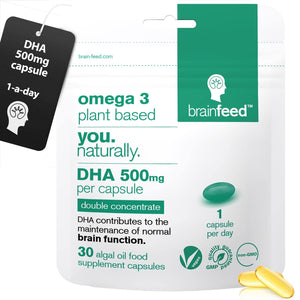High-quality omega 3: decoding the total oxidation value
filter
In the realm of nutritional health, staying informed about the quality of the nutrients you consume is of paramount importance. DHA, short for docosahexaenoic acid, is an omega 3 fatty acid renowned for its profound benefits on brain health and vision in adults, fetuses and breastfed babies[1,2]. As the demand for DHA-rich supplements grows, so does the need to ensure their quality and freshness. Here’s where the concept of Total Oxidation Value comes in. It’s a measure that safeguards the potency of these supplements and assures you of their beneficial effects. In this article, we delve into the significance of Total Oxidation Value and why you should care, backed by scientific studies.
Ensuring nutrient integrity
DHA is a delicate molecule vulnerable to oxidation, a process that can render it ineffective and potentially harmful[3,4]. DHA supplements can be exposed to oxygen, light, and heat during production, transportation, and storage, leading to oxidation[5]. The initial results of oxidation are so-called peroxides, which are also called primary oxidation products[6]. Eventually, secondary oxidation products, also known as aldehydes, are formed[6]. They are mainly responsible for the unpleasant odour of the oil. The total oxidation value or TOTOX marks the quality, conformity, safety and freshness of the omega 3 preparation or the oil used in it. It reflects the total oxidation of primary and secondary oxidation products. Monitoring the DHA total oxidation value provides a crucial insight into the freshness and integrity of the supplement.
Empowering informed choices
In an era where nutritional supplements abound, the responsibility of making informed choices falls upon consumers. Understanding the significance of DHA Total Oxidation Value empowers you to select high-quality supplements that deliver the promised benefits. According to the Global Organization for EPA and DHA Omega 3, the Council for Responsible Nutrition, the International Fish Oil Standards and the European Food Safety Authority, the TOTOX value needs to be 26 or lower[6,7]. Every supplement company should strive to produce the lowest TOTOX fish oil or algae oil.
Algae in a capsule
Algae has emerged as a remarkable source of DHA as a sustainable approach, providing omega 3 to the evergrowing mass of people who want to keep their brains healthier for longer. A study on DHA and the oxidation patterns found that DHA oil with certain anti-oxidants, which help prevent oxidation to a certain extent, remains more stable over time[8]. One of the anti-oxidants that is frequently used is vitamin E, which can be encapsulated together with DHA to ensure the maximum quality possible[9].
Away from the light
UV light, while essential for life, can pose challenges to the stability of omega 3 products. Prolonged exposure to UV radiation may induce oxidation and degrade the beneficial compounds, diminishing their potency. An overview of light-induced oxidation highlights that UV light can trigger oxidation, reducing the efficacy of omega 3 in promoting brain health[10]. Innovative packaging solutions, studied to offer light-protective food packaging, offer protection against UV rays[11]. Embracing such advancements safeguards the nutritional value and ensures that consumers can harness the full potential of omega 3 without fish taste for their well-being.
Vegan, sustainable and high-quality omega 3
brain feed developed a 500 mg DHA vegan softgel capsule made from algae oil. During the encapsulation process, the exposure, temperature and humidity of algae oil are controlled to ensure that brain feed’s product can be one of the non-fishy omega 3 supplements. This also allows the oil to stay as clear as possible. Because algae oil is prone to oxidation, brain feed’s encapsulating process is carefully designed. A soy-derived anti-oxidant, vitamin E, is added to algae oil to help the quality of the oil and keep the fishy taste away. The oil itself is cooled down in storage twice during a process known as winterisation, and filtered before, after and in between each cooling down step to ensure the oil is as clear as possible. brain feed’s packaging also provides an additional layer of securing the quality of algae oil can stay the same. The packaging contains permanent UV light and moisture barriers which ensure the preservation of DHA and tasteless omega 3. brain feed DHA’s value of primary oxidation products is 5, whereas the value of secondary oxidation products is 8. Therefore, the TOTOX value is 18, meaning that only 18.8% of oil has oxidised. This showcases the high quality of the product as the TOTOX value is significantly lower than the guidelines recommend.
By selecting products with low oxidation values, you're making a proactive choice to protect your health, promote longevity, and support your cognitive well-being. Remember, it's about the quality and effectiveness of what you consume.
References
[1] EFSA (2011). Scientific Opinion on the substantiation of health claims related to docosahexaenoic acid (DHA), eicosapentaenoic acid (EPA) and brain, eye and nerve development (ID 501, 513, 540), maintenance of normal brain function (ID 497, 501, 510, 513, 519, 521, 534, 540, 688, 1323, 1360, 4294), maintenance of normal vision (ID 508, 510, 513, 519, 529, 540, 688, 2905, 4294), maintenance of normal cardiac function (ID 510, 688, 1360), “maternal health; pregnancy and nursing” (ID 514), “to fulfil increased omega-3 fatty acids need during pregnancy” (ID 539), “skin and digestive tract epithelial cells maintenance” (ID 525), enhancement of mood (ID 536), “membranes cell structure” (ID 4295), “anti-inflammatory action” (ID 4688) and maintenance of normal blood LDL-cholesterol concentrations (ID 4719) pursuant to Article 13(1) of Regulation (EC) No 1924/2006. EFSA Journal, 9(4), 2078–2108.
[2] EFSA (2009). Scientific Opinion of the Panel on Dietetic Products, Nutrition and Allergies on a request from Merck Selbstmedikation GmbH on DHA and support of the cognitive development of the unborn child and breastfed infant. The EFSA Journal, 1007, 1–14.
[3] Yakubenko, V. P., & Byzova, T. V. (2017). Biological and pathophysiological roles of end-products of DHA oxidation. Biochimica et Biophysica Acta (BBA) - Molecular and Cell Biology of Lipids, 1862(4), 407–415.
[4] Mason, R. P., & Sherratt, S. C. R. (2017). Omega-3 fatty acid fish oil dietary supplements contain saturated fats and oxidized lipids that may interfere with their intended biological benefits. Biochemical and Biophysical Research Communications, 483(1), 425–429.
[5] Ismail, A., Bannenberg, G., Rice, H. B., Schutt, E., & MacKay, D. (2016). Oxidation in EPA- and DHA-rich oils: An overview. Lipid Technology, 28(3–4), 55–59.
[6] The oxidation of fish oil / omega 3 (Ω3) and the TOTOX value (2023). YPSI. https://www.ypsi.de/en/blogs/news/die-oxidation-von-fischoel-omega-3-3-und-der-totox-wert#:~:text=The%20TOTOX%20value%20(%20total%20oxidation,the%20oil%20used%20in%20it.
[7] EFSA (2010). EFSA Panel on Biological Hazards (BIOHAZ); Scientific Opinion on Fish Oil for Human Consumption. Food Hygiene, including Rancidity. EFSA Journal, 8(10), 1874-1920.
[8] Ahonen, E., Damerau, A., Suomela, J.-P., Kortesniemi, M., & Linderborg, K. M. (2022). Oxidative stability, oxidation pattern and α-tocopherol response of docosahexaenoic acid (DHA, 22:6n–3)-containing triacylglycerols and ethyl esters. Food Chemistry, 387, 132882.
[9] Kubo, K., Saito, M., Tadokoro, T., & Maekawa, A. (1997). Changes in susceptibility of tissues to lipid peroxidation after ingestion of various levels of docosahexaenoic acid and vitamin E. British Journal of Nutrition, 78, 655–669.
[10] Cheng, Y.-S., Linetsky, M., Gu, X., Ayyash, N., Gardella, A., & Salomon, R. G. (2019). Light-induced generation and toxicity of docosahexaenoate-derived oxidation products in retinal pigmented epithelial cells. Experimental Eye Research, 181, 325–345.
[11] Mahmoodi, A., Ghodrati, S., & Khorasani, M. (2019). High-Strength, Low-Permeable, and Light-Protective Nanocomposite Films Based on a Hybrid Nanopigment and Biodegradable PLA for Food Packaging Applications. ACS Omega, 4(12), 14947–14954.


 alertness
alertness
 cognition
cognition
 sleep
sleep
 wellbeing
wellbeing








Leave a comment
Open tab